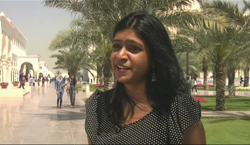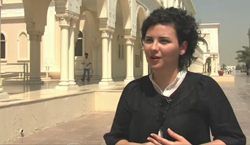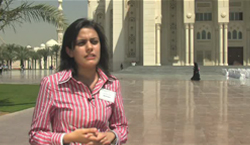IMF Youth Dialog Held at the American University of Sharjah (UAE)
Roundtable SummaryMarch 11, 2010
 At the IMF Youth Dialog roundtable, a group of about 15 students at the American University of Sharjah in the United Arab Emirates shared their views on a wide range of economic issues. The students participated actively in a debate about unemployment, governance, education-skills mismatch, competitiveness, the development of the private sector, and the role of the IMF.
At the IMF Youth Dialog roundtable, a group of about 15 students at the American University of Sharjah in the United Arab Emirates shared their views on a wide range of economic issues. The students participated actively in a debate about unemployment, governance, education-skills mismatch, competitiveness, the development of the private sector, and the role of the IMF.
Students pointed to the development of human capital as the top priority for policymakers in the UAE. They discussed at length the merits of emiratization, a set of government policies to lessen the impact of the engagement of foreign labor on employment opportunities of the locals. Emiratization, one student argued, creates inefficiencies in the labor market because of the mismatch between labor-market demands and nationals’ skills. This can work in a booming economy, the student said, but, in an economic downturn, it proves to be too costly and drives firms out of business.
 Another student observed that the Arab world would need to create 100 million new jobs within the next 20 years to satisfy the demands of youth employment. In recent years, she said, the UAE’s economic development pattern has largely focused on private-sector activities, such as construction and tourism, which create mainly low-skilled jobs in the long run. The government’s priority should instead be to create high-skilled employment in the UAE through the collaborative efforts of academia, government, and industry.
Another student observed that the Arab world would need to create 100 million new jobs within the next 20 years to satisfy the demands of youth employment. In recent years, she said, the UAE’s economic development pattern has largely focused on private-sector activities, such as construction and tourism, which create mainly low-skilled jobs in the long run. The government’s priority should instead be to create high-skilled employment in the UAE through the collaborative efforts of academia, government, and industry.
Increasing female participation in the labor force is also key, another student stressed, observing that the number of males in post-secondary education is decreasing, with only 19 percent of the Emirati student body male and 81 percent female. But if you look at employment, the student said, the ratio actually reverses—only 19 percent of Emirati females are actively looking for jobs. Human capital is therefore being developed, but not put to use.
The government has taken steps to open up jobs to women, such as granting extended maternity leave and adopting international conventions on equal opportunity, the student noted. But more needs to be done—such as enacting work-from-home policies and a flexible work week. Other students agreed, noting that the UAE’s strict laws requiring that workers show up at the physical office location are outmoded. But they acknowledged that cultural barriers—which will change only gradually—still pose limits on women in the workplace.
 The students also led a spirited discussion of the IMF’s role in the global financial crisis. The IMF deserves credit for having played a key role in helping overcome the crisis, one said, and has put a lot of effort into its core activity, which is to help stabilize the global economy. She noted that the IMF had also more than doubled its assistance to low-income countries. But the IMF must educate its member countries on how capital markets work, she emphasized, and create more accountability mechanisms to regulate the workings of the markets.
The students also led a spirited discussion of the IMF’s role in the global financial crisis. The IMF deserves credit for having played a key role in helping overcome the crisis, one said, and has put a lot of effort into its core activity, which is to help stabilize the global economy. She noted that the IMF had also more than doubled its assistance to low-income countries. But the IMF must educate its member countries on how capital markets work, she emphasized, and create more accountability mechanisms to regulate the workings of the markets.
Another student discussed the importance of the IMF’s role in promoting transparency—for example, through the Special Data Dissemination Standard, in which countries voluntarily provide economic and financial data about their economies. The IMF should play the role of intermediary between countries to make market information more freely available, the student said, stressing that “the IMF has to make governments understand that it’s not just their own financial sector that they’re responsible for, but the financial sector of the global economy at large.”
Students also raised the issue of immigration policy. One student argued that for people to come to the UAE, there should be incentives beyond make money. People need to be encouraged to actually take up residence and settle in the country in order to feel some sense of ownership. Rethinking the immigration policy might be a first step toward addressing the demand issue that the real estate sector is facing, the student asserted.
More fundamentally, the students observed, Dubai faces a choice between fast growth and sustainable growth. The country is trying, even in a time of crisis, to finance major construction projects. “Why finance a hotel when you have more pressing issues, like helping the youth with their education?” one student asked. “Dubai is trying to grow exponentially, but it’s jeopardizing the resources that we have for tomorrow’s growth for future generations.”

